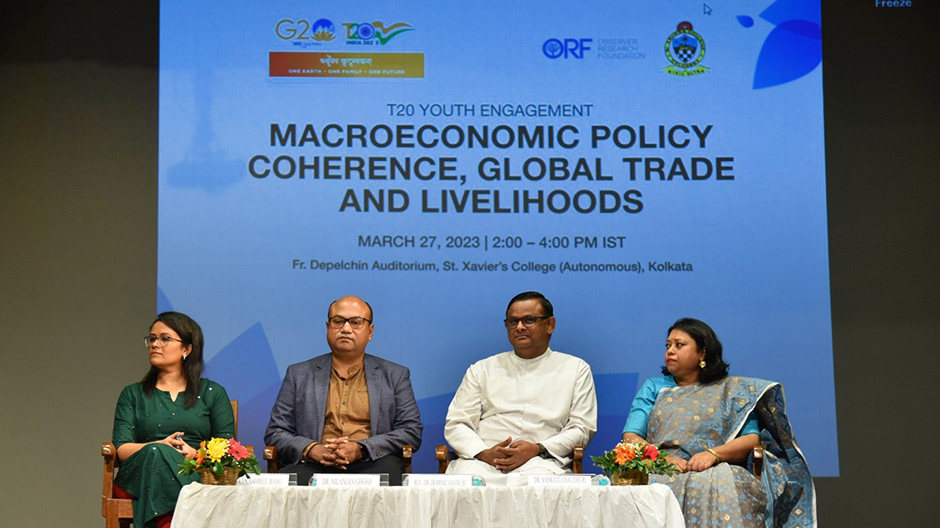In line with one of the seven thematic task forces comprising the Think20 (T20)—Macroeconomics, Trade, and Livelihoods: Policy Coherence and International Coordination—the Observer Research Foundation (ORF), in collaboration with St. Xavier’s College (Autonomous), Kolkata, hosted a T20 Youth Engagement on the theme “Macroeconomic Policy Coherence, Global Trade and Livelihoods” in Kolkata.
The event mainly focused on acquainting the youth with the workings of the G20 as well as the influence, impact, and importance of the T20 platform. Additionally, it included a discussion on global geopolitical developments and concerns, as well as some geoeconomic aspects of India’s international trade policy. Finally, it highlighted the sustainability of India’s growth and sought to encourage cross-disciplinary conversations on critical geoeconomic, geopolitical, and developmental aspects of India’s domestic and foreign policy outreach.
In his inaugural address, the principal of St. Xavier’s College, Dominic Savio, said, “Policies should be treated like adding a spice to an already existing mixture of spices.” According to him, the effectiveness of the policy is determined by the final taste of the mixture. “If the flavour suits every individual’s palate, it is a good policy,” he added. The inaugural address was followed by a presentation on T20 that focused on exploring new avenues to the sustainable development goals (SDGs), by Pratnashree Basu, Associate Fellow at ORF.
A chair of the T20 Task Force on “Macroeconomics, Trade, and Livelihoods: Policy Coherence and International Coordination” and Vice-Chancellor at Dr. B.R. Ambedkar School of Economics University, Bengaluru, Prof. N.R. Bhanumurthy then addressed the context in which the G20 was formed as well as its purpose. He went on to elucidate the grouping’s contemporary role in shaping coordinated international policy responses amidst the prevailing global macroeconomic uncertainties and challenges.
Director of the Centre for New Economic Diplomacy at ORF and T20 Secretariat Director, Dr. Nilanjan Ghosh, thereafter spoke on the geopolitics, geoeconomics, and sustainomics of India’s growth story. After tersely explaining regional trade agreements and free trade agreements (FTAs), Dr. Ghosh elucidated India’s concerns with the Regional Comprehensive Economic Partnership (RCEP) that eventually led to New Delhi’s withdrawal from negotiations in 2019. He rationalised India’s withdrawal in terms of the country’s increasing trade deficit with China, adverse balance of trade with most RCEP countries, and India’s prospects among all RCEP nations in terms of business competitiveness.
In his address, Dr. Ghosh highlighted New Delhi’s endeavour to seek alternative geoeconomic opportunities via FTAs with friendly nations such as the India-UAE Comprehensive Economic Partnership Agreement, the India-Australia Comprehensive Economic Cooperation Agreement, or the United States-launched Indo-Pacific Economic Forum, and how these are providing India with significant economic and geostrategic opportunities. While concluding his speech, Dr. Ghosh pointed out that despite the prevailing global economic gloom, India continues to demonstrate high and resilient economic growth because of its massive human capital pool and continued investment in infrastructure. In his view, India can, therefore, emerge as a sustainable success story even amidst a dismal global economy, with Indian diplomacy playing a salient role in leveraging the country’s potential.
Dr. Ghosh’s speech was followed by four presentations from students of the Department of Economics, St. Xavier’s College. These addressed the welfare impact of FTAs, the trickle-down effect of economic growth to agriculture in the context of global food supply chains, and the affordability and accessibility of India’s digital public infrastructure.
The T20 side event concluded with a question-and-answer session wherein students and members of the audience were provided the opportunity to ask questions to the panellists, and concluded with a vote of thanks by Dr. Saswati Chaudhuri, Associate Professor, Department of Economics, St. Xavier’s College.
This report is compiled by Aditya Bhan, Fellow, ORF.




